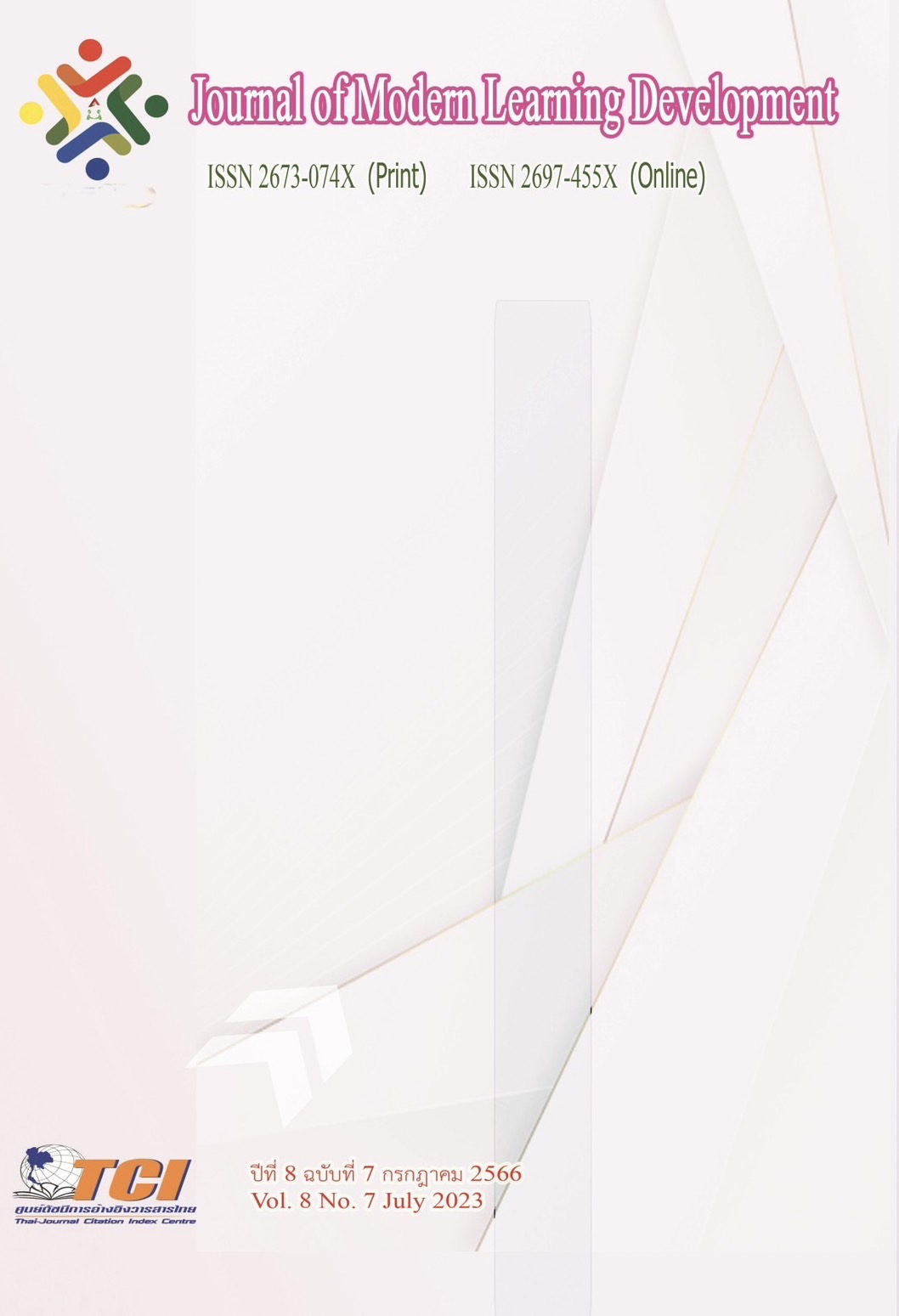Factors Affecting on Academic Motivation of Secondary Vocational Students in China
Main Article Content
Abstract
This study aims to investigate the relationship between academic motivation, academic self-efficacy, learning interest, emotions, learning habits, student-teacher relationship and parental social support and to investigate the factors that affect the academic motivation of secondary vocational students in China. They are academic self-efficacy, learning interest, emotions, learning habits, student-teacher relationship, and parental social support.
The participants were 266 students of secondary vocational school. The research instruments were questionnaires. Descriptive statistics, Pearson's correlation coefficient and stepwise regression analysis were used for data analysis.
The results show as follows:
1. According to the the correlation analysis method. It can be concluded that academic motivation of secondary vocational students is significantly positively correlated with academic self-efficacy (X1), learning interest (X2), and student-teacher relationship (X5) at a level of 0.5, and that there is a significant positive correlation between academic motivation and social support from parents (X6) at a level of 0.01. Academic motivation of vocational students is significantly negatively correlated with emotions (X3) and study habits (X4). This means that the dependent variable may increase or decrease when the independent variable changes, and it may be changed by external factors.
2. According to the stepwise regression analysis of the results, there are four factors that affect the academic motivation of vocational students in China: academic self-efficacy (X1), learning interest (X2), learning habits (X4), and student-teacher relationships (X5). The results show that emotions (X3) and social support from parents (X6) have no significant effect on academic motivation.
The unstandardized coefficients of the predictor were written as an equation as follows:
Ŷ = .792+ . 592 X1+ .166 X2 + .124 X5+ (-. 093 X4)
The standardized coefficients of the forecaster were written as an equation as follows:
Z = .573 X1 + .124 X5 + .135 X2+ (- .081 X4)
Article Details
References
Arlianty, W. N. (2017). An analysis of interest in students learning of physical chemistry experiment using Scientific approach. In International Journal of Science and Applied Science: Conference Series. 1 (2), 109-116. International Journal of Science and Applied Science Conference Series 1(2):109, https://doi.org/10.20961 /ijsascs.v1i2.5130
Bandura, A., & Locke, E. A. (2003). Negative self-efficacy and goal effects revisited. Journal of applied psychology, 88 (1), 87. https://doi.org/10.1037/0021-9010.88.1.87
Christi Bergin, (2021), Positive Teacher-Student Relationships Have Cascading Benefits. https://doi.org/10.1016/j.learninstruc.2022.101581
Gunawan, I., Kusumaningrum, D. E., & Sumarsono, R. B. (2019, December). Investigation of Principal Leadership Based on Pesantren: Descriptive Study about Implementation of Human Resources Empowerment Models Based on Soft System Methodology. In The 4th International Conference on Education and Management (COEMA 2019) (pp. 255-258). Atlantis Press. Advances in Social Science, Education and Humanities Research, volume 381, https://doi.org/10.2991/coema-19.2019.52
Herpratiwi, H., & Ahmad, T. (2022). Learning interest and discipline on learning motivation. International Journal of Education in Mathematics, Science, and Technology (IJEMST), 10(2), 424-435. https://doi.org/10.46328/ijemst.2290
Pajares, F., & Schunk, D. (2001). The development of academic self-efficacy. Development of achievement motivation. United States, 7, 1-27. https://doi.org/10.1016 /B978-012750053-9/50003-6
Richard, H., & Raffel, M. (2001). Principle and applications of the background oriented schlieren (BOS) method. Measurement science and technology, 12(9), 1576.
Tasgin, A., & Coskun, G. (2018). The Relationship between Academic Motivations and University Students' Attitudes towards Learning. International Journal of Instruction, 11(4), 935-950. https://doi.org/10.12973/iji.2018.11459a
Tezci, E., Sezer, F., Gurgan, U., & Aktan, S. (2015). A study on social support and motivation. The Anthropologist, 22(2), 284-292. https://doi.org/10.1080/ 09720073.2015.11891879
Vatankhah, M., & Tanbakooei, N. (2014). The role of social support on intrinsic and extrinsic motivation among Iranian EFL learners. Procedia-Social and Behavioral Sciences, 98, 1912-1918. Procedia - Social and Behavioral Sciences 98:1912-1918, https://doi.org/10.1016/j.sbspro.2014.03.622
Wardani, A. D., Gunawan, I., Kusumaningrum, D. E., Benty, D. D. N., Sumarsono, R. B., Nurabadi, A., & Handayani, L. (2020, November). Student learning motivation: A conceptual paper. In 2nd Early Childhood and Primary Childhood Education (ECPE 2020) (275-278). Atlantis Press.
Wilkesmann, U., Fischer, H., & Virgillito, A. (2012). Academic motivation of students-the German case (1-20).zhb. https://doi.org/10.17877/DE290R-3281


